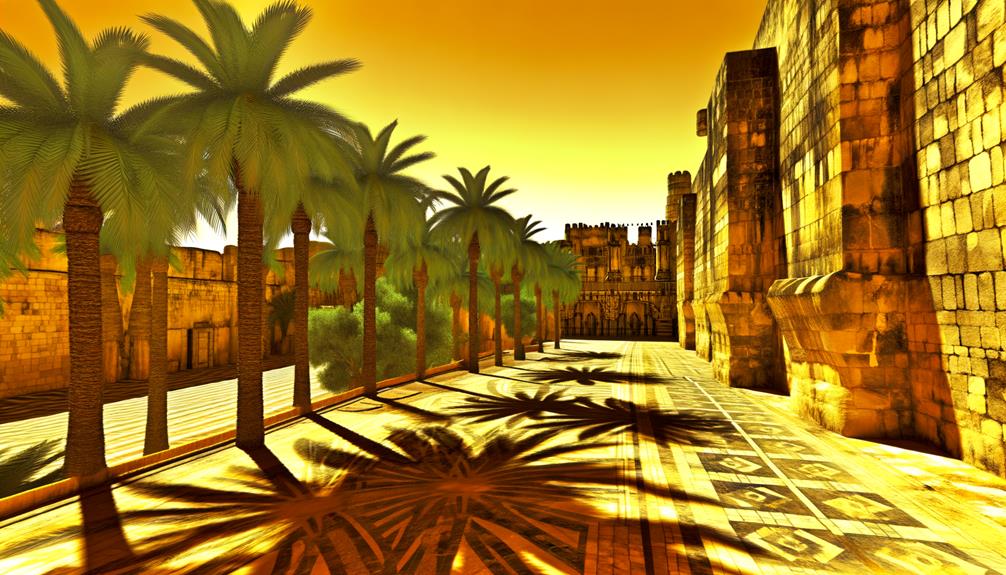Meaning of the Name Jericho
The name 'Jericho' originates from the ancient Hebrew word 'Yeriḥo,' potentially linked to the Canaanite word for 'moon' (Yareah), indicating early lunar worship. Jericho holds significant biblical importance, notably in the Book of Joshua, where its conquest symbolizes divine intervention.
Archaeological findings validate its ancient heritage, marking it as one of the oldest inhabited cities. The city's lush environment inspired its name, meaning 'fragrance' in Semitic languages.
Today, Jericho remains a crucial cultural and archaeological site, reflecting its historical and spiritual legacy. Discover its extensive history and enduring legacy in our deep exploration.

Key Takeaways
- Jericho derives from the ancient Hebrew 'Yeriḥo,' linked to the Canaanite word for 'moon' (Yareah).
- The name reflects early lunar worship practices in the city's history.
- 'Jericho' means 'fragrance' in ancient Semitic languages, referencing its lush palm groves.
- The city's name symbolizes its ancient cultural and religious significance.
- Jericho's etymology offers insights into ancient Near Eastern socio-religious dynamics.
Etymology of Jericho
The name 'Jericho' is derived from the ancient Hebrew word 'Yeriḥo,' which is believed to be linked to the Canaanite word for 'moon' (Yareah), suggesting a possible connection to lunar worship.
This etymological link implies that the city's early inhabitants might have venerated a moon deity. Linguistic evidence supports this hypothesis, as many ancient Near Eastern cultures incorporated celestial bodies into their religious practices.
Additionally, Jericho's strategic location and fertile lands likely made it a significant settlement, further embedding its name in historical and cultural contexts.
The linguistic roots of 'Jericho' offer a glimpse into the region's ancient socio-religious dynamics, highlighting the interplay between language, culture, and belief systems in early civilizations.
Jericho in Biblical Texts
Jericho holds a prominent place in biblical texts, primarily due to its ancient city significance and the dramatic narrative of the walls of Jericho.
The Book of Joshua recounts the conquest of Jericho, highlighting its strategic and symbolic importance for the Israelites.
This story not only underscores Jericho's historical relevance but also provides a rich source for linguistic and theological analysis.
Ancient City Significance
Renowned for its ancient walls and pivotal role in Israelite history, the city of Jericho is prominently featured in biblical texts, symbolizing both divine intervention and the fulfillment of prophetic promises. Its significance is underscored through various narratives, including the conquest led by Joshua, wherein the city's fall represents a divine directive. Jericho also serves as a geographical and spiritual landmark, marking the Israelites' progression into the Promised Land.
| Aspect | Description | Biblical Reference |
|---|---|---|
| Divine Mandate | God's command to conquer Jericho | Joshua 6:2 |
| Prophetic Fulfillment | The fall of Jericho as a fulfillment of God's promises | Joshua 6:20 |
| Geographical Significance | Entry point to the Promised Land | Joshua 3:16 |
| Spiritual Symbolism | Representation of faith and obedience | Hebrews 11:30 |
| Historical Context | One of the oldest inhabited cities | Archaeological findings |
This encapsulates Jericho's multifaceted role in biblical history.
Walls of Jericho
Among the most famous narratives in the biblical texts, the story of the Walls of Jericho stands out as a dramatic example of divine intervention and military strategy.
Found in the Book of Joshua, this story recounts how the Israelites, guided by divine command, encircled the fortified city of Jericho for seven days. On the seventh day, the priests sounded their trumpets, and the people shouted, causing the walls to collapse.
Historically, Jericho is one of the oldest walled cities, dating back to 8000 BCE, and its fortifications were significant in ancient Near Eastern warfare.
Linguistically, 'Jericho' derives from the Hebrew 'Yeriho,' possibly linked to 'reah,' meaning fragrance, or 'yareach,' meaning moon, reflecting its ancient cultural significance.
Joshua's Conquest Story
Building on the significance of the Walls of Jericho, the biblical account of Joshua's conquest provides a detailed narrative of the Israelites' strategic and divinely guided victory over the ancient city. According to the Book of Joshua, the Israelites, led by Joshua, circled the city for seven days with the Ark of the Covenant. On the seventh day, they circled seven times, blew trumpets, and the walls miraculously collapsed. This story not only illustrates divine intervention but also symbolizes the fulfillment of God's promise to the Israelites.
Linguistically, 'Jericho' is believed to derive from the Canaanite word 'Reah,' meaning 'fragrant,' indicative of the city's lush palm groves. Consequently, the conquest narrative blends historical, spiritual, and linguistic dimensions.
Archaeological Discoveries
Archaeological excavations at the site of ancient Jericho have uncovered extensive city ruins, shedding light on its historical significance.
Notable discoveries include artifacts that corroborate biblical accounts, providing tangible evidence of the city's long-standing cultural and religious significance.
These findings offer vital insights into the etymology and historical context of the name Jericho.
Ancient City Ruins
Frequently regarded as one of the oldest continuously inhabited cities in the world, Jericho's ancient ruins have yielded a wealth of archaeological discoveries that offer profound insights into early human civilization.
Excavations have revealed a series of ancient settlements dating back to the Neolithic era, approximately 10,000 BCE. Notable findings include the iconic stone tower and extensive fortification walls, signifying advanced architectural practices.
The unearthed artifacts, such as pottery, tools, and early forms of art, provide invaluable information on the social and economic structures of early societies. Jericho's stratified layers highlight the city's long-term occupation and resilience, reflecting significant shifts in human development, technology, and adaptation over millennia.
These discoveries enrich our understanding of human history and cultural evolution.
Biblical Artifacts Found
Jericho has intermittently yielded significant Biblical artifacts, providing critical material evidence that corroborates historical narratives found in ancient scriptures. Excavations have unearthed relics that span millennia, shedding light on Jericho's storied past.
| Artifact | Period | Significance |
|---|---|---|
| City Walls | Bronze Age | Potential link to Joshua's conquest |
| Pottery Fragments | Neolithic | Evidence of early human settlement |
| Ancient Tower | Pre-Pottery | Suggests advanced prehistoric society |
| Scarabs | Middle Kingdom | Indicates Egyptian influence |
These discoveries offer invaluable insights into Jericho's cultural and historical context, enhancing our understanding of its role in Biblical events. Each artifact, through meticulous analysis, contributes to the intricate tapestry of human history, revealing the profound interplay between archeology and ancient texts.
Cultural Significance
How does the name 'Jericho' encapsulate its profound cultural significance across various historical epochs and linguistic traditions?
The name 'Jericho,' rooted in ancient Semitic languages, denotes 'fragrance,' reflecting its historical reputation for abundant palm trees and balsam gardens.
Archaeologically, Jericho is one of the oldest inhabited cities, dating back to 9000 BCE, marking it as a cradle of early human civilization.
Linguistically, the name has traversed millennia, appearing in Hebrew Scriptures as 'Yeriḥo' and in Arabic as 'Arīḥā.' This continuity underscores Jericho's enduring presence in cultural narratives.
Its depiction in biblical texts as the first city conquered by Israelites imbues it with spiritual and historical gravitas, making Jericho a symbol of resilience and human ingenuity.
Modern-Day Jericho
In contemporary times, Jericho's unique blend of ancient heritage and modern development positions it as a focal point of cultural and archaeological tourism in the Palestinian territories. Recognized as one of the oldest continuously inhabited cities, Jericho seamlessly integrates its historical landmarks with contemporary urban growth. Tourists and scholars alike are drawn to its rich tapestry of Bronze Age ruins and vibrant city life.
| Aspect | Historical Context | Modern Development |
|---|---|---|
| Archaeology | Site of ancient ruins | Active excavation projects |
| Tourism | Biblical significance | Hotels and amenities |
| Agriculture | Ancient irrigation | Modern farming techniques |
Jericho's enduring significance is enhanced by its ability to showcase the continuity of human civilization from prehistory to the present day.
Symbolism and Legacy
The ancient city's profound historical significance extends beyond its physical ruins, embodying rich symbolism and a lasting legacy in cultural and religious contexts.
In biblical narratives, Jericho represents divine intervention and faith, epitomized by the fall of its walls in the Book of Joshua.
Linguistically, the name Jericho, derived from the Hebrew 'Yeriho,' is often associated with the word 'reyach,' meaning fragrance, suggesting a place of abundance and fertility.
Its legacy persists in religious traditions, symbolizing spiritual victory and renewal.
Additionally, Jericho's archaeological prominence as one of the earliest known urban centers underscores its enduring influence on our understanding of early human civilization.
Hence, Jericho's multifaceted symbolism continues to resonate through time and scholarship.
Conclusion
The name Jericho, steeped in ancient etymology and biblical narratives, stands as a symbol of resilience and transformation. Through archaeological revelations and cultural significance, Jericho bridges the temporal divide between antiquity and the present.
Its modern-day existence underscores a legacy that continues to evoke historical reverence and scholarly intrigue. The journey of Jericho, from its biblical roots to contemporary relevance, remains a proof to the enduring power of names in shaping human history and identity.






